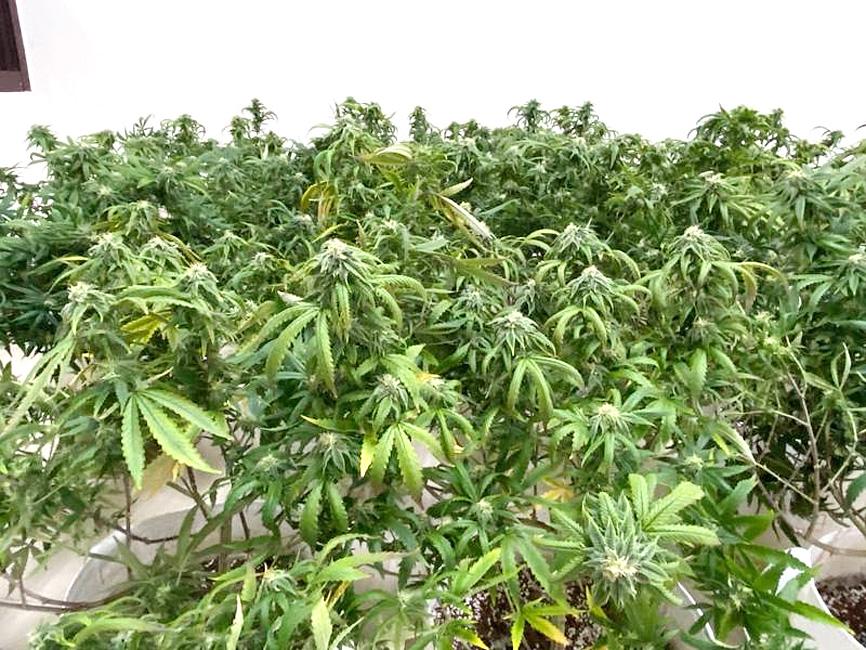The Legislative Yuan yesterday passed an amendment reducing the penalty for growing cannabis for personal use from at least five years in prison to one to seven years in jail. Those found guilty can also be fined up to NT$1 million (US$34,211).
However, people found guilty of cultivating cannabis with the intention of selling it as a narcotic still face at least five years in prison and can be fined up to NT$5 million, according to the Narcotics Hazard Prevention Act (毒品危害防制條例).
The Executive Yuan proposed the amendment on March 11 last year. Premier Su Tseng-chang (蘇貞昌) at the time cited Constitutional Interpretation No. 790, which says that the penalties for growing cannabis failed to meet the principle of proportionality as stated in the Constitution.

Photo: Chan Shih-hung, Taipei Times
“Punishment should be made in accordance with the gravity of the crime,” Su said, adding that heavy punishments should not be imposed on those found guilty of petty crimes.
The Constitutional Court, then called the Council of Grand Justices, issued the interpretation on March 20, 2020, saying that at least five years of jail time should not be the only punishment for cultivating a small amount of cannabis for personal use.
Under Taiwanese law, cannabis is listed as a Category 2 narcotic.
However, there have been calls over the past few years for cannabis to be decriminalized and its medical use allowed.

Taiwanese can file complaints with the Tourism Administration to report travel agencies if their activities caused termination of a person’s citizenship, Mainland Affairs Council Minister Chiu Chui-cheng (邱垂正) said yesterday, after a podcaster highlighted a case in which a person’s citizenship was canceled for receiving a single-use Chinese passport to enter Russia. The council is aware of incidents in which people who signed up through Chinese travel agencies for tours of Russia were told they could obtain Russian visas and fast-track border clearance, Chiu told reporters on the sidelines of an event in Taipei. However, the travel agencies actually applied

New measures aimed at making Taiwan more attractive to foreign professionals came into effect this month, the National Development Council said yesterday. Among the changes, international students at Taiwanese universities would be able to work in Taiwan without a work permit in the two years after they graduate, explainer materials provided by the council said. In addition, foreign nationals who graduated from one of the world’s top 200 universities within the past five years can also apply for a two-year open work permit. Previously, those graduates would have needed to apply for a work permit using point-based criteria or have a Taiwanese company

The Shilin District Prosecutors’ Office yesterday indicted two Taiwanese and issued a wanted notice for Pete Liu (劉作虎), founder of Shenzhen-based smartphone manufacturer OnePlus Technology Co (萬普拉斯科技), for allegedly contravening the Act Governing Relations Between the People of the Taiwan Area and the Mainland Area (臺灣地區與大陸地區人民關係條例) by poaching 70 engineers in Taiwan. Liu allegedly traveled to Taiwan at the end of 2014 and met with a Taiwanese man surnamed Lin (林) to discuss establishing a mobile software research and development (R&D) team in Taiwan, prosecutors said. Without approval from the government, Lin, following Liu’s instructions, recruited more than 70 software

BACK TO WINTER: A strong continental cold air mass would move south on Tuesday next week, bringing colder temperatures to northern and central Taiwan A tropical depression east of the Philippines could soon be upgraded to be the first tropical storm of this year, the Central Weather Administration (CWA) said yesterday, adding that the next cold air mass is forecast to arrive on Monday next week. CWA forecaster Cheng Jie-ren (鄭傑仁) said the first tropical depression of this year is over waters east of the Philippines, about 1,867km southeast of Oluanpi (鵝鑾鼻), and could strengthen into Tropical Storm Nokaen by early today. The system is moving slowly from northwest to north, and is expected to remain east of the Philippines with little chance of affecting Taiwan,